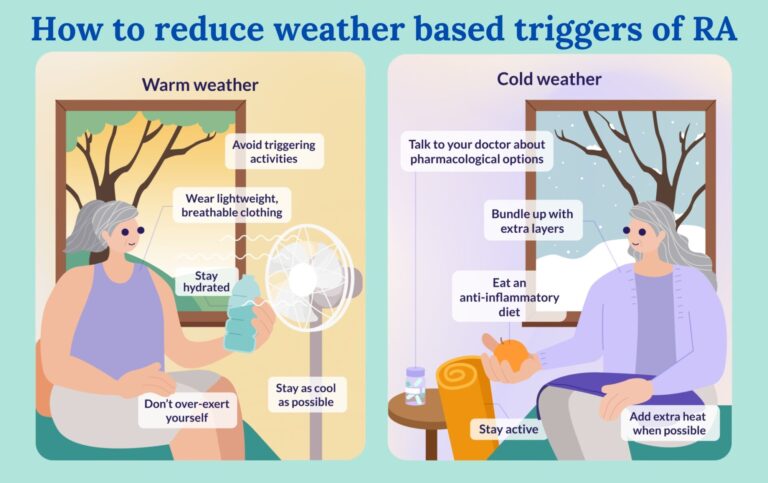Arthritis is a common condition that causes joint pain and stiffness, impacting millions of people worldwide. While several factors influence arthritis symptoms, many individuals notice a direct correlation between their discomfort and the weather. Understanding how weather affects arthritis can help you manage symptoms and maintain comfort throughout the year.
Why Does Weather Impact Arthritis?
The exact connection between weather and arthritis symptoms isn’t fully understood, but several theories provide some clarity:
Barometric Pressure Changes:
A drop in barometric pressure, often associated with rainy or stormy weather, can cause joints to swell and become painful. This is because lower pressure may lead to increased fluid buildup in the joints.Temperature Fluctuations:
Cold weather can stiffen muscles and joints, making movement more challenging for arthritis patients. On the other hand, high humidity combined with heat may also exacerbate discomfort for some.Activity Levels:
People tend to stay indoors and reduce physical activity during extreme weather conditions, which can weaken muscles supporting the joints and lead to stiffness.
Seasonal Effects on Arthritis
- Winter Woes:
Cold temperatures and icy conditions often bring the worst of arthritis pain. Blood flow to the joints may decrease in colder climates, and muscles around the joints may tighten. - Rainy Days:
Many arthritis patients report increased pain before it rains. This is likely due to barometric pressure changes. - Summertime Discomfort:
For some, the heat and humidity of summer can also trigger joint swelling and fatigue. - Autumn and Spring:
The transitional seasons, with their unpredictable weather changes, may also bring on flare-ups for arthritis sufferers.

Tips to Stay Comfortable Year-Round
Though you cannot control the weather, you can take steps to manage arthritis symptoms effectively:
Dress for the Weather:
- In winter: Wear layers to keep your body warm, especially around your joints. Gloves and knee warmers can be especially helpful.
- In summer: Choose light, breathable fabrics to prevent overheating and maintain comfort.
Stay Active:
Regular exercise helps strengthen the muscles around your joints, improving mobility and reducing stiffness. Adapt your activities to suit the weather—indoor yoga during the winter and swimming during the summer are great options.Maintain a Healthy Weight:
Extra weight puts added pressure on your joints, exacerbating pain. A balanced diet and regular exercise can help you manage your weight and arthritis symptoms.Hydrate Regularly:
Staying hydrated helps keep your joints lubricated, particularly in hot and humid weather.Warm Up Before Activity:
A quick warm-up helps reduce joint stiffness and prevents injury. This is especially important during colder months.Use Heat or Cold Therapy:
- Heat packs can soothe stiff joints in the winter.
- Cold compresses may reduce inflammation and swelling during the summer.
Track the Weather:
Keep an eye on forecasts to anticipate changes in your arthritis symptoms. If you notice that certain conditions trigger pain, plan your activities accordingly.Medications and Supplements:
Consult your doctor about medications or supplements that may help manage your symptoms, particularly during weather changes.
When to Seek Professional Help
If your arthritis symptoms significantly worsen with the weather, consider seeking professional advice. A joint specialist can help you develop a personalized plan to manage your condition effectively.
Dr. Kritesh Mishra, a renowned Joint Replacement & Sports Injury Specialist, offers comprehensive arthritis care to help patients achieve better mobility and quality of life.
Conclusion
Understanding how weather affects arthritis is crucial for managing symptoms effectively. While weather changes are beyond your control, adopting proactive measures can significantly improve your comfort and mobility throughout the year. By staying active, dressing appropriately, and seeking medical advice when necessary, you can minimize the impact of weather on your arthritis and enjoy a healthier, more active life.
For expert care, consult Dr. Kritesh Mishra, Joint Replacement & Sports Injury Specialist.
Frequently Asked Questions
How weather affects arthritis symptoms?
Weather changes, such as drops in barometric pressure or cold temperatures, can increase joint swelling, stiffness, and pain in arthritis patients.
Why does arthritis pain worsen in winter?
Cold weather can reduce blood flow to joints and cause muscles to tighten, leading to increased stiffness and discomfort in people with arthritis.
Can hot weather also impact arthritis?
Yes, high heat and humidity can trigger joint swelling and fatigue in some arthritis patients, though it varies from person to person.
What can I do to relieve arthritis pain during bad weather?
Stay active, dress appropriately for the weather, use heat or cold therapy, and keep your joints warm in winter or hydrated in summer.
Should I see a doctor if my arthritis worsens with weather changes?
Yes, consult a specialist like Dr. Kritesh Mishra if your symptoms worsen significantly or if you need a tailored management plan.



